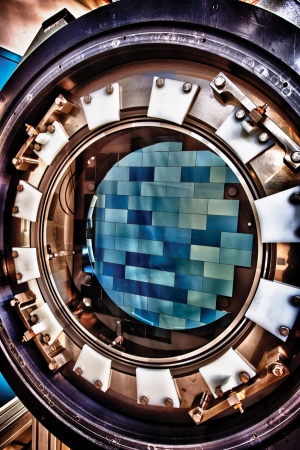Dark energy is considered as a mysterious force that is accelerating the expansion of the Universe. Two surveys intend to utilize weak gravitational lensing to better understand dark energy and the behavior of gravity in other parts of the universe.

The Dark Energy Survey camera will investigate millions of galaxies for the subtle effects of weak lensing. R. Hahn/FERMILAB
Pictures of distant galaxies look a bit lopsided because light from distant galaxies pass through shoals of invisible matter which cause minute stretching and shearing of these objects. This phenomenon occurs due to distortion of space-time by mass.
Astronomers intend to use a Dark Energy Survey (DES) camera to study the effects of weak lensing on millions of galaxies. They intend to map the distribution and density of dark matter. Presently, they track using cosmic landmarks such as ripples in galaxy distribution and candles of distant supernovae. While these reveal the Universe’s expansion rate, weak lensing provides information about gravity action through the distortions.
Detailed surveys of millions of galaxies are required for detecting the subtle effects of weak lensing. In strong gravitational lensing, a single galaxy’s image is distorted by a major concentration of mass. The new surveys will be using a 870 million pixel Hyper Suprime-Cam (HSC) on the 8 m Subaru telescope in Hawaii. It is expected to image 10 million galaxies over 1,500-square-degrees by 2018.
The DES project is to be commenced on the 4 m Blanco telescope in Chile. The DES has a 570 million pixel digital camera. It will be able to image 300 million galaxies over 5,000 square degrees. However, detection of weak lensing may be difficult even with these cameras. In 2019, the European Space Agency intends to launch Euclid, a dark-energy probe.
Disclaimer: The views expressed here are those of the author expressed in their private capacity and do not necessarily represent the views of AZoM.com Limited T/A AZoNetwork the owner and operator of this website. This disclaimer forms part of the Terms and conditions of use of this website.